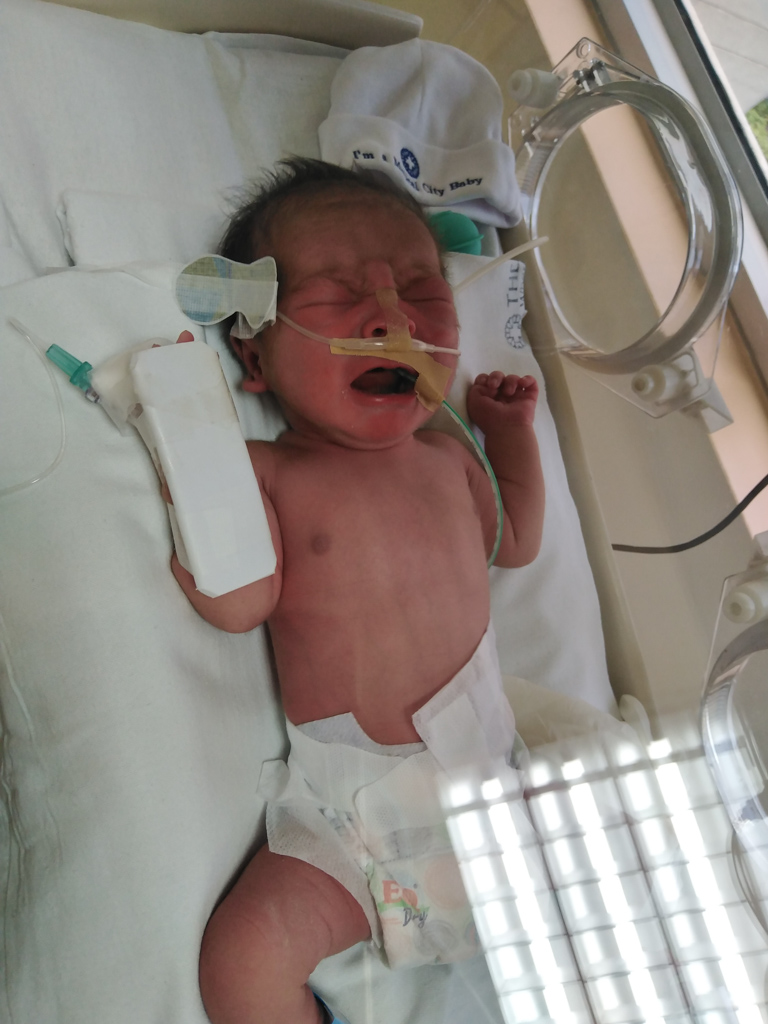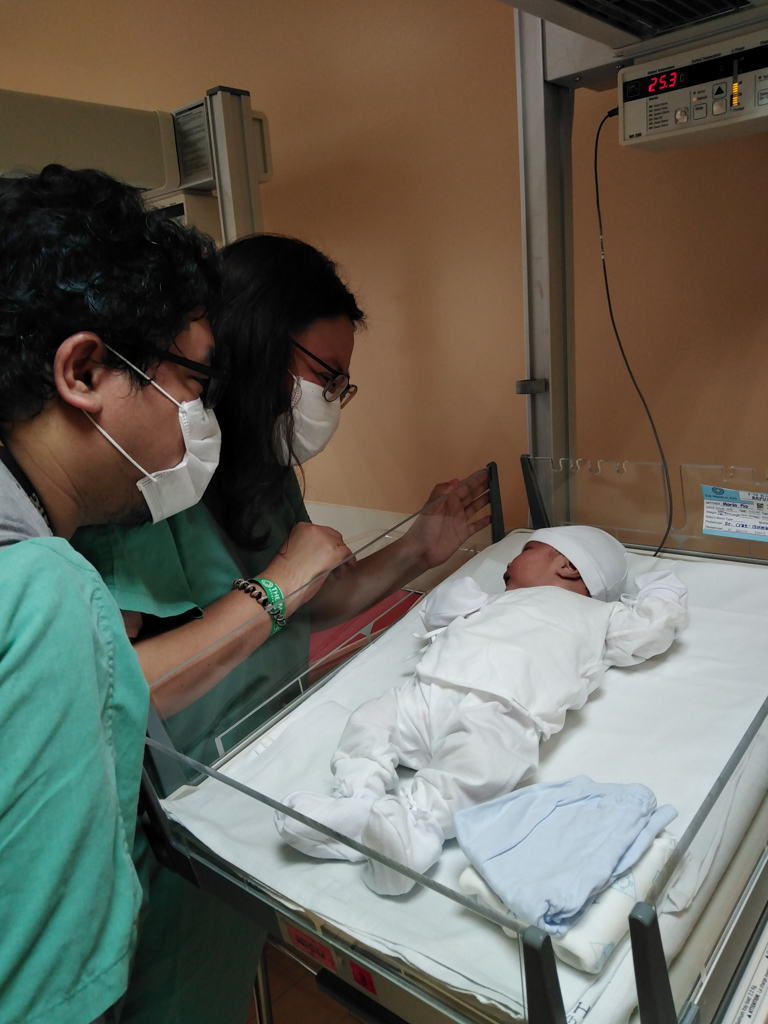We use cookies to ensure you get the best browsing experience. By continued use, you agree to our privacy policy and accept our use of such cookies. For further information, click FIND OUT MORE.
By JESSICA BARTOLOME
Video by Lala Babilonia-Lacsina
May 29, 2020
It was supposed to be a simple check-up.
Pia Rapusas had just found out news that she’s been praying for the past seven years: she’s pregnant.
She and her husband Jonathan have been married since 2012. They have been wishing, sometimes crying, for a baby for just as long.
With Pia suffering from polycystic ovary syndrome (PCOS), they knew the chances were slim. But one day in 2014, as Pia was pleading to God, she claims to have heard a promise from Him: that she will have a baby, and his name will be Isaiah.
Pia and Jon are devout Christians, so they held on to hope, to God’s promise of a child. But seven years is a long time.
Desperate, the couple had already been considering adoption, when strange things started happening on May 6, well into the enhanced community quarantine imposed on Luzon.
Pia started experiencing pain in her abdomen. She started vomiting. For the next two days, she’d brush it off as dysmennorhea, even though the cramps would keep her up at night. She took some medicine that took away the nausea but did nothing for the pain.
On May 8, she decided it wasn’t normal anymore. A test confirmed what she was hoping for, and at that point, suspected.
But despite the joy from the pregnancy news, the pain didn’t abate. Pia and Jon decided to go to the hospital to see what their next steps would be. They were thinking about future check-ups with their obstetrician-gynecologist, some prenatal vitamins, and pregnancy do’s and don’ts.
They definitely weren’t expecting the doctor to say, “Ma’am, ulo na po ang nakakapa ko (Ma’am, I can feel the head).”
“Sabi ko, huh? Joke ba ‘to? (I said, huh? Is this a joke?),” Pia recalls in an interview with GMA News Online.
This triggered a commotion among the staff, until the head of the OB department approached her. “Manganganak ka na. Nagle-labor ka. (You’re about to give birth. You’re in labor),” she was told. “Your only decision is, Are you going to give birth here or in another hospital?”
They agreed to stay. Everything started going by in a blur. She was taken to the operating room — by some miracle, her water had broken there in Medical City, and her cervix was already dilated by three centimeters. She was going to give birth “anytime soon.”
The hospital staff attempted to let her have a normal delivery at first, but the baby’s pulse was weakening. They rushed to give her a Caesarean section instead.
Isaiah David was born on May 8, 4:46 p.m. Pia had carried him for 38 weeks — a full term.
For three days, she had been in labor, and she didn’t even know. For seven years she’s been waiting, only for everything she had been praying for to come in one day.
How could this have happened?

The strange phenomenon is what doctors call cryptic pregnancy.
It is defined as a pregnancy where the woman is not aware that she is pregnant, up until the she is about to give birth. obstetrician-gynecologist Dr. Rebecca Singson explains. About one in 475 women experience cryptic pregnancy.
It all boils down to Pia’s pre-existing condition: PCOS.
"Kasi ang mga PCOS talagang hindi sila nag-o-ovulate, so hindi sila nagme-menstruate ng regular. They keep trying and trying to get pregnant, all of a sudden nabuntis sila and they are not aware of it," she added.
(“Those who have PCOS don’t ovulate, so they don’t menstruate regularly. They keep trying and trying to get pregnant, all of a sudden they’re pregnant and they’re not aware of it.”)
Women who experience cryptic pregnancy usually don't show symptoms: no dizziness, and in Pia's case, no visible weight changes.
Dr. Singson says cryptic pregnancy cases usually have a high chance of resulting in stillbirth, premature labor, or root retardation.
“Mas mataas talaga 'yung incidents ng mga prenatal complications kasi imagine these women went through in the entire pregnancy without any prenatal check-up,” she says. “The mortality for children of cryptic pregnancy is up to 15 percent kaya talagang in danger kapag hindi sila na-prenatal check-up.”
(“The chances of prenatal complications are really high, because these women went throught the entire pregnancy without any prenatal check-up. The mortality for children of cryptic pregnancy is up to 15 percent so it is really dangerous if they don’t undergo prenatal check-ups.”)
Singson says Pia’s weight might have contributed to them missing the pregnancy. Pia says she never noticed anything different about her tummy, attributing it to her being a “big girl.”

Still heavily medicated from the surgery, Pia saw her baby for only a brief moment, before he was carted off into the neonatal intensive care unit (NICU). Amid the virus threat, the new mom had just taken a COVID-19 test, and the results wouldn’t be ready anytime soon.
She would later test negative for the dreaded disease.
But Isaiah David was not yet in the clear. Amid the stress of childbirth, he had swallowed some of his own poop in the womb, leading him to develop pneumonia. This is a condition doctors call meconium staining, a sign of fetal distress.
For Jon, the whole thing was a rollercoaster. He certainly did not expect that he’d be welcoming a baby so soon after learning that his wife is pregnant. He recalled how, as he was on his way to get a hospital room for his wife, a doctor had approached him and told him they were having a baby girl.
The news struck him as wrong somehow, but he was just relieved that he was having a baby. It was only when he was reunited with his wife, who was still under the influence of anesthesia, that she told him, The baby is a boy.
At the time, Jon couldn’t help his bark of amazed laughter. They had been waiting for so long for a baby named Isaiah. He was finally here.
Isaiah David was in the NICU for two weeks. As Pia recovered at home, Jon religiously visited the NICU, watching his tiny miracle inside the incubator.
“Noong umpisa... makikita ko lang siya from afar. Hindi ko siya makita... Humingi pa talaga ako ng favor sa nurse na piktyuran talaga up close. And then the days passed gradually… lumalabas siya sa incubator, then ayun na. Nahawakan ko siya. May feeding tube pa siya. And then meron siyang oxygen tube,” Jon says.
(“In the beginning, I’d only see him from afar. I had to ask a nurse to take a picture of him up close. And then the days passed gradually...he was taken out of the intubator, and I was able to hold him. He had a feeding tube, and an oxygen tube.”)

The brand new parents were finally able to bring Isaiah David home on May 23.
They were daunted. Parents usually had nine months or more to prepare for the monumentl task of raising a baby. They had missed every milestone, from gender reveals to baby seminars, and they went straight to day one of parenthood. They didn’t even have diapers — their friends had to send them everything they needed via Grab and Lalamove.
As they begin to learn the pattern of his cries, the reality that they really wouldn’t sleep much the first few weeks is sinking in.
But the couple wouldn’t have it any other way. In fact, they’ve already decided on a nickname: Davis.
“Kasi nga binaligtad niya ang buhay namin in a day, 'di ba?” Pia explained. “Binaligtad. Davis. Isaiah David, David Isaiah, talagang binaligtad niya ang aming buhay. Sobrang he brought joy naman sa amin.”
(“Because he turned our world upside down. Davis. Isaiah David, David Isaiah, he turned our world upside down. But he brought so much joy to us.”)
Looking back, so many things could have gone wrong during the pregnancy, and they never would have known until it’s too late.
In a rush of belated worry, Pia recalls how she had drunk coffee a lot, and ate raw dishes, and even had a massage. She was suddenly thankful that Luzon was placed under ECQ in March, as she was able to work from home, and eat healthier because her passion for cooking was revived.
In some cases of cryptic pregnancy, some women have actually given birth in toilet bowls completely by accident. Pia was really lucky that her water broke in the hospital.
They were lucky, too, that Isaiah David seemed determined to stay alive.
“Sabi ko, grabe itong batang ito. He's a fighter. He's brave kasi talagang nakakapit lang siya doon… Matindi ang kapit niya sa aking tummy,” Pia says with a smile.
(“I thought, this child, he’s a fighter. He’s brave because he really held on. He held on tight in my tummy.”

Pia describes the baby as a blessing, noting how his birth meant that the promise from the world came true.
Still, is giving birth and raising a child smack in the middle of a pandemic truly the right time? For the Rapusas couple, there’s only one answer.
“Si Lord 'pag nagbigay ng promise, laging on time. He is never, ever late. [This is the] right time, kasi 38 [na kami]. Nag-lose na kami ng mga fear. Nag-lose na kami ng hope. We were considering adoption, kasi gusto namin magka-baby,” Pia says.
Jon adds, “We're not just aware... but the Lord is already doing something.”
They still could not quite believe it happened to them.
“All glory to Him for this miracle sa buhay naming mag-asawa. At sa amin talaga ginawa ano. Kay Jon at Pia Rapusas nangyari itong kuwentong ito,” she says.
(“All glory to Him for this miracle in our lives. And it happened to us. This story really happened to Jon and Pia Rapusas.”)